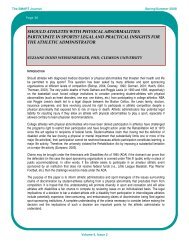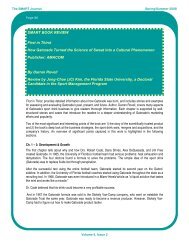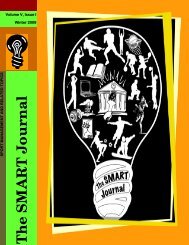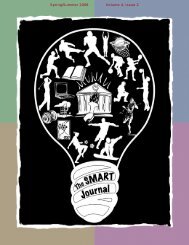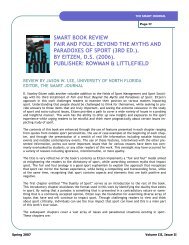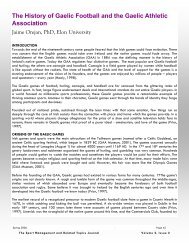examining the body of scholarship in sport management
examining the body of scholarship in sport management
examining the body of scholarship in sport management
You also want an ePaper? Increase the reach of your titles
YUMPU automatically turns print PDFs into web optimized ePapers that Google loves.
SMART Onl<strong>in</strong>e Journal Volume 2, Issu e 1The SMART Journal Fall 2005 Volume 2, Issue 1responsibility to provide <strong>the</strong> field with anappropriate <strong>body</strong> <strong>of</strong> literature. This, <strong>the</strong>n, raises aquestion that begs consideration: Who isresponsible for monitor<strong>in</strong>g and adjust<strong>in</strong>g <strong>the</strong> <strong>sport</strong><strong>management</strong> <strong>body</strong> <strong>of</strong> literature? The stakeholders<strong>in</strong> <strong>sport</strong> <strong>management</strong> perhaps <strong>in</strong>clude academics,students, journal editors/owners, book authors,and <strong>in</strong>dustry practitioners. We submit that <strong>the</strong>primary responsibility falls on <strong>the</strong> shoulders <strong>of</strong>academics because <strong>the</strong>y are responsible for <strong>sport</strong><strong>management</strong> education: provid<strong>in</strong>g <strong>the</strong> appropriateeducation for <strong>in</strong>dividuals to work <strong>in</strong> <strong>the</strong> <strong>sport</strong>bus<strong>in</strong>ess <strong>in</strong>dustry.Journal editors are also academics. However, <strong>the</strong>yhave <strong>the</strong> added responsibility as gatekeepers <strong>of</strong>some <strong>of</strong> <strong>the</strong> literature. Discourse <strong>in</strong> <strong>the</strong> academicsett<strong>in</strong>g is most <strong>of</strong>ten shaped by publish<strong>in</strong>g and“<strong>in</strong>volvement with <strong>the</strong> gatekeep<strong>in</strong>g <strong>in</strong>stitutions <strong>in</strong>publish<strong>in</strong>g” (Aitchison, 2001, p. 2). Power andcontrol reside with <strong>the</strong> gatekeepers whomAitchison (2001) and Spender (1981) identified asjournal editors and reviewers and publish<strong>in</strong>gadvisors. These people “set <strong>the</strong> parameters <strong>in</strong>which <strong>in</strong>dividuals are encouraged to work if <strong>the</strong>ywish to be at <strong>the</strong> center <strong>of</strong> issues <strong>in</strong> <strong>the</strong>irdiscipl<strong>in</strong>e” (Spender, 1981, p. 186). Althougheditors have no control over researchers’ <strong>in</strong>terests,editors can <strong>in</strong>fluence research <strong>in</strong> specific areasthat could impact <strong>the</strong> coverage <strong>of</strong> topics <strong>in</strong> <strong>the</strong>journal. For example, this can be done with special<strong>the</strong>me issues: journal editors could specify specific<strong>the</strong>mes that cover <strong>the</strong> miss<strong>in</strong>g or low percentagetopics and <strong>in</strong>vite guest editors to manage thoseissues. This would be far more productive andprogressive than rely<strong>in</strong>g on <strong>the</strong> traditional method<strong>of</strong> wait<strong>in</strong>g for submitted ideas for <strong>the</strong>me issues.There is concern that needs exam<strong>in</strong>ation <strong>in</strong>relation to gender. Even with better numbers than<strong>the</strong> previous studies on o<strong>the</strong>r journals, <strong>the</strong>material <strong>in</strong> JSM does not appropriately reflect <strong>the</strong><strong>in</strong>dustry <strong>in</strong> relation to women <strong>in</strong> <strong>sport</strong>. Therecould be much improvement <strong>in</strong> this area. JSMeditors, as well as <strong>the</strong> owners <strong>of</strong> <strong>the</strong> journal,NASSM, would be wise to <strong>in</strong>vestigate this ando<strong>the</strong>r gender related issues. As noted by Aichison(2001), “academic associations that have directl<strong>in</strong>ks with academic journals have a duty toPage 45ensure that <strong>the</strong>ir journals are accountable to <strong>the</strong>irmembers” (p. 17).The f<strong>in</strong>d<strong>in</strong>gs <strong>of</strong> this study lend empirical evidenceto <strong>the</strong> accusations and concerns <strong>of</strong> leaders <strong>in</strong> <strong>sport</strong><strong>management</strong> <strong>in</strong> relation to <strong>the</strong> disparity <strong>of</strong>coverage and representation <strong>of</strong> <strong>sport</strong> <strong>management</strong>content areas, <strong>sport</strong> <strong>in</strong>dustry segments, andwomen’s <strong>sport</strong>s. Therefore, it appears that <strong>the</strong>re isroom for improvement <strong>of</strong> <strong>the</strong> depth and breadth <strong>of</strong>our research literature. Scholars such as Parks,Paton, Pitts, Olafson, Chelladurai, and Slack havequestioned and challenged <strong>the</strong> frequent lack <strong>of</strong>scope <strong>in</strong> <strong>the</strong> research <strong>in</strong> <strong>the</strong> field <strong>of</strong> <strong>sport</strong><strong>management</strong>. There is more <strong>of</strong>ten than not animpression given from <strong>the</strong> literature <strong>in</strong> our fieldthat <strong>the</strong> study <strong>of</strong> <strong>sport</strong> <strong>management</strong> is ma<strong>in</strong>ly just<strong>the</strong> study <strong>of</strong> manag<strong>in</strong>g college athletics and somepr<strong>of</strong>essional <strong>sport</strong>s. Paton (1987) challenged <strong>sport</strong><strong>management</strong> researchers to broaden <strong>the</strong>ir scopeafter he reported that <strong>the</strong> <strong>sport</strong> <strong>management</strong>literature had a heavy focus on careers <strong>in</strong> highereducation and college athletics. Slack (1996) addedthat <strong>the</strong> JSM devoted 65% <strong>of</strong> its articles to <strong>the</strong>subjects <strong>of</strong> physical education and <strong>in</strong>tercollegiateathletics. A cursory evaluation by Pitts (2001) <strong>of</strong><strong>sport</strong> <strong>management</strong> journals, conferenceproceed<strong>in</strong>gs, and <strong>sport</strong> <strong>management</strong> textbooksonly to fur<strong>the</strong>r report that little had changed withthis heavy focus on college athletics. Pitts (2001)challenged <strong>sport</strong> <strong>management</strong> researchers,publishers, and editors to not ignore collegeathletics and pr<strong>of</strong>essional <strong>sport</strong>s, but to take on<strong>the</strong> responsibility <strong>of</strong> expand<strong>in</strong>g <strong>the</strong> scope <strong>of</strong> <strong>the</strong>irpublications to <strong>in</strong>clude more aspects <strong>of</strong> <strong>the</strong> vastunder-explored aspects <strong>of</strong> <strong>the</strong> <strong>sport</strong> <strong>management</strong>field. As Soucie and Doherty (1996) stated, whilemultiple studies on some key topics are warrantedand cause scholars to <strong>of</strong>ten feel a strong pulltoward pursu<strong>in</strong>g similar <strong>in</strong>vestigations, “<strong>the</strong> scope<strong>of</strong> research options <strong>in</strong> <strong>sport</strong> <strong>management</strong> is almostlimitless” (p. 498).It appears that <strong>the</strong> <strong>body</strong> <strong>of</strong> knowledge <strong>in</strong> <strong>sport</strong><strong>management</strong> research is <strong>in</strong> need <strong>of</strong> researcherswith a vision and <strong>scholarship</strong> that can enhance<strong>the</strong> literature and fill <strong>the</strong> gaps. This will ensurethat <strong>the</strong> field’s literature reflects what scholars <strong>in</strong><strong>the</strong> field claim to be <strong>the</strong> <strong>sport</strong> bus<strong>in</strong>ess <strong>in</strong>dustry.THE SMART JOURNAL



